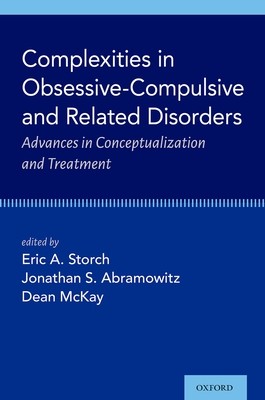
- We will send in 10–14 business days.
- Author: Storch
- Publisher: Oxford University Press, USA
- ISBN-10: 0190052775
- ISBN-13: 9780190052775
- Format: 16.5 x 24.6 x 3.8 cm, kieti viršeliai
- Language: English
- SAVE -10% with code: EXTRA
Complexities in Obsessive Compulsive and Related Disorders (e-book) (used book) | bookbook.eu
Reviews
Description
Obsessive-Compulsive and Related Disorders (OCRDs) have received considerable attention over the past two decades culminating with the inclusion of a new classification category of "Obsessive-Compulsive and Related Disorders" (OCRDs) in DSM-5. This group of conditions includes OCD along with two newly minted conditions (Hoarding Disorder and Excoriation Disorder) and others previously classified as Somatoform Disorders (Body Dysmorphic Disorder) and Impulse Control Disorders (Hair Pulling Disorder). The implications for research on these conditions, as well as their relations with one another, are significant since their aggregation is based on putative central mechanisms with limited empirical support to date. Indeed, the past decades have seen a dramatic surge in research on OCRDs. Such scholarship has occurred across several domains including clinical phenomenology, assessment, and psychological therapies. A complete synthesis of the emerging data across these domains would
be beyond the scope of a single journal article or series of articles while having the ability to comprehensively discuss advances in the field and stimulating in these areas
As researchers and clinicians will be increasingly focused on this topic in light of the changes to DSM-5 - together with the dearth of current objective available information - this book will be a timely addition to the literature in guiding clinicians in advances in OCRDs that will impact their practice. Third, a number of conditions outside the OCRD chapter in DSM-5 are often proposed as "related" to OCD (e.g., misophonia).
EXTRA 10 % discount with code: EXTRA
The promotion ends in 21d.17:25:30
The discount code is valid when purchasing from 10 €. Discounts do not stack.
- Author: Storch
- Publisher: Oxford University Press, USA
- ISBN-10: 0190052775
- ISBN-13: 9780190052775
- Format: 16.5 x 24.6 x 3.8 cm, kieti viršeliai
- Language: English English
Obsessive-Compulsive and Related Disorders (OCRDs) have received considerable attention over the past two decades culminating with the inclusion of a new classification category of "Obsessive-Compulsive and Related Disorders" (OCRDs) in DSM-5. This group of conditions includes OCD along with two newly minted conditions (Hoarding Disorder and Excoriation Disorder) and others previously classified as Somatoform Disorders (Body Dysmorphic Disorder) and Impulse Control Disorders (Hair Pulling Disorder). The implications for research on these conditions, as well as their relations with one another, are significant since their aggregation is based on putative central mechanisms with limited empirical support to date. Indeed, the past decades have seen a dramatic surge in research on OCRDs. Such scholarship has occurred across several domains including clinical phenomenology, assessment, and psychological therapies. A complete synthesis of the emerging data across these domains would
be beyond the scope of a single journal article or series of articles while having the ability to comprehensively discuss advances in the field and stimulating in these areas
As researchers and clinicians will be increasingly focused on this topic in light of the changes to DSM-5 - together with the dearth of current objective available information - this book will be a timely addition to the literature in guiding clinicians in advances in OCRDs that will impact their practice. Third, a number of conditions outside the OCRD chapter in DSM-5 are often proposed as "related" to OCD (e.g., misophonia).


Reviews